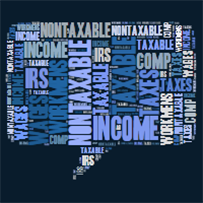
Are you confused about what income is taxable and what income is not taxable?
Taxable income can include money you receive, such as wages and tips, or noncash income from property or services. For example, both parties in a barter exchange must include the fair market value of goods or services received as income on their tax return. Taxable income must be reported to the IRS on the Federal income tax return and is subject by law to tax.
Nontaxable income may still have to be shown on a tax return but is not subject to taxes.
Some types of income are not taxable except under certain conditions or if specifically given an exemption by the law, including:
- Life insurance proceeds paid to you are usually not taxable. But if you redeem a life insurance policy for cash, any amount that is more than the cost of the policy is taxable.
- Income from a qualified scholarship is normally not taxable. This means that amounts you use for certain costs, such as tuition and required books, are not taxable. However, amounts you use for room and board are taxable.
- If you got a state or local income tax refund, the amount may be taxable. You should have received a Form 1099-G from the agency that made the payment to you. If you didn’t get it by mail, the agency may have provided the form electronically. Contact them to find out how to get the form. Report any taxable refund you got even if you did not receive Form 1099-G.
Here are some types of income that are usually not taxable:
- Foster care payments
- Gifts and inheritances
- SSI payments
- Child support payments
- Welfare benefits
- Damage awards for physical injury or sickness
- Cash rebates from a dealer or manufacturer for an item you buy
- Reimbursements for qualified adoption expenses
Other taxable and nontaxable income
For more on this topic see Publication 525, Taxable and Nontaxable Income.


